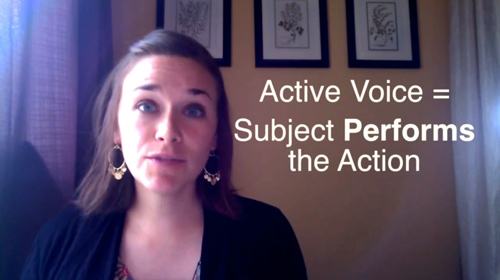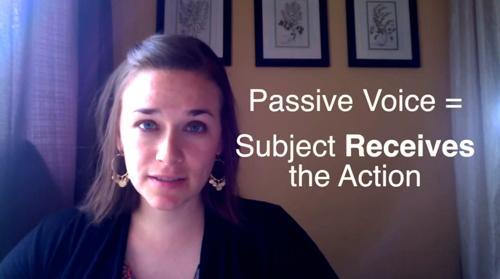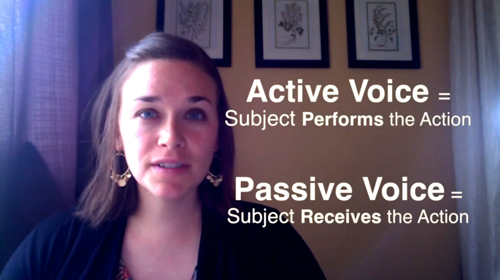Download your free grammar guide here.
Download your free grammar guide here.
What are passive verbs?
What are passive verbs?
- Home
- Usage & Rules
- Passive or Active?
You've probably heard of the terms passive verbs and passive voice, but do you know what they mean? Do you know how they relate to active verbs and the active voice?
You'll be relieved to know that you can understand the difference by asking just one simple question: Is the subject performing the action of the verb or receiving the action of the verb?
In order to understand this concept, you need to understand subjects and action verbs.
- Subjects tell us whom or what a sentence is about. Mary sang.
- Action verbs show action. Mary sang.
Note that this discussion doesn't include linking verbs. Why? The topic of active and passive only relates to action verbs, and linking verbs don't show action.
Action verbs can be written in two different "voices." These voices tell us whether the subject is performing the action (active voice) or receiving the action (passive voice).
Subject Performs the Action = Active Voice
When the subject of a sentence is performing the action of the verb, the sentence is written in the active voice.
In the following examples, the subjects are underlined and the verbs are in bold. Notice that the subjects are performing the actions.
My grandma made this scarf.
The class took the test.
The storm demolished many buildings.

All of those sentences have active verbs. We can also say that they are in the active voice.
In all of those sentences, the subject is the doer of the action. That is the only thing a sentence needs in order for it to be written in the active voice, so all of those sentences are active.
Subject Receives the Action = Passive Voice (Passive Verb)
When the subject of the sentence is receiving the action of the verb, the sentence is written in the passive voice.
Look over the sentences below and notice that the subjects are not doing anything. They are not performing the action of the verb. They are the ones receiving the action.
This scarf was made by my grandma.
The test was taken by the class.
Many buildings were demolished by the storm.

All of those sentences have passive verbs. We can also say that they are written in the passive voice.
In all of those sentences, the subject is the receiver of the action. That is the only thing a sentence needs in order for it to be written in the passive voice, so all of those sentences are passive.
Many times, the doer of the action is written in a prepositional phrase (by my grandma, by the class, by the storm). However, passive verbs don't need to include the doer of the action. Notice that the sentences below don't tell us who or what performed the action.
The scarf was made.
The sentence was diagrammed.
A test was taken.
Did you also notice that those sentences sound really lame? That brings us to our next topic...
Should you use active or passive verbs?
The active voice is stronger, snappier, and more direct than the passive voice. It highlights the doer of the action. Use the active voice in your writing as your default.
Use the passive voice when...
- You don't know who performed the action.
My car was stolen.
- You want to highlight the receiver of the action rather than the doer of the action. Steven Pinker says, "The passive is the better construction when the done-to is currently the target of the reader's mental gaze."
The suspect was arrested.
- Your writing is technical.
The hydraulic test was performed to ascertain the chemical properties of the liquid in Joe's mug.
It's Time For A Quiz!
Let's see how much you know. The following quiz contains ten questions. Identify whether each sentence has a passive or active verb.
Are you ready?
Get Started with the Quiz Here *
* This link opens a Google form with the quiz. After you answer all ten questions, you'll receive feedback letting you know which questions you got right and which questions you got wrong. Enjoy!


Hello! I'm Elizabeth O'Brien, and my goal is to get you jazzed about grammar.
This is original content from https://www.english-grammar-revolution.com/passive-verbs.html
Our Free Guide Gives You A Fun Way
To Teach And Learn The Basics v

Elizabeth O'Brien is the creator of Grammar Revolution.
Her lessons are guaranteed to give you more confidence in your communication skills and make you smile. :)
Other Helpful Resources
